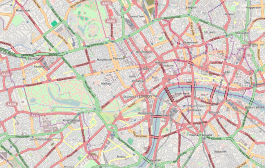City Road tube station
| City Road | |
|---|---|
 The station remains in 2004 | |
| Location | City Road |
| Local authority | Islington |
| Owner | City & South London Railway |
| Number of platforms | 2 |
| Key dates | |
| 17 November 1901 | Opened |
| 8 August 1922 | Closed |
| Other information | |
| Coordinates | 51°31′47″N 0°05′51″W / 51.52972°N 0.09750°W |
City Road is a disused London Underground station in Islington, central London. It was opened in 1901 as part of the City & South London Railway's extension from Moorgate Street to Angel. The station was located on the City Road between Old Street and Angel stations. The railway is now part of the Northern line.
The station was closed in 1922 due to low passenger usage. The underground tunnels remain at track level,[1] but the station remained derelict until the 1960s, when it was demolished except for the structure around the original lift shaft. This remained at City Road's junction with Central Street and Moreland Street until the late 2010s, when it was replaced by the Bunhill 2 Energy Centre.
History
[edit]
From the start, City Road station was little used, and discussions of its closure were held as early as 1908: less than seven years after it was opened.[2] The station was close to both Old Street and Angel, and was in a deprived area of Islington. However, City Road remained until 8 August 1922 when the City & South London Railway's northern section between Euston and Moorgate Street was closed to enable the diameter of the tunnels to be increased from 10 ft 6 in (3.20 m) to the Underground's standard diameter of 11 ft 8+1⁄4 in (3.56 m), so that larger and longer Standard Stock trains could be operated.
Low passenger usage meant that the required expansion of the platform tunnels and upgrading of the station could not be justified on financial grounds, and City Road remained closed when the line was reopened on 20 April 1924. The platforms were removed and the lift shaft was converted for use as a ventilation shaft. City Road was the only twin tunnel station on the line not to be reconstructed. During the Second World War the station was converted for use as an air-raid shelter.[2]

The station building remained until the 1960s, when all but the structure immediately around the original lift shaft was demolished.[2] At track level the temporary structures for the air-raid shelter were removed after the war and the site of the platforms can be seen from passing trains.[2]
Planning permission was granted in 2015 to demolish the remaining station structure for phase 2 of Islington Borough Council's scheme to heat the nearby King Square council estate.[3] The Bunhill 2 Energy Centre opened on the site in 2020, capturing waste heat from the Northern Line tunnels to provide heat to additional residential buildings and a school.[4][5]
| Former route | ||||
|---|---|---|---|---|
| Preceding station | Following station | |||
| Angel towards Euston
|
Northern line (1901-22)
|
Old Street towards Clapham Common
| ||
Accidents
[edit]On 26 August 1916 a passenger was killed when a guard signalled for a train to depart before all of the passengers had alighted.[2][6]
References
[edit]- ^ "City Road Station – Subterranea Britannica". Archived from the original on 3 December 2023. Retrieved 28 April 2024.
- ^ a b c d e Connor, J. E. (2001) [1999]. "City Road". London's Disused Underground Stations (2nd ed.). Capital Transport. pp. 20–21. ISBN 1-85414-250-X.
- ^ "Bunhill 2 Energy Centre". Cullinan Studio. Archived from the original on 25 February 2019. Retrieved 24 February 2019.
- ^ Crook, Lizzie (11 March 2020). "Waste heat from London Underground begins warming capital's homes". Dezeen. Archived from the original on 29 March 2020. Retrieved 11 March 2020.
- ^ Moreland, Jamie (6 March 2020). "How the London Underground is heating homes". BBC News (video, 2 mins, 8 secs). Archived from the original on 8 April 2020. Retrieved 8 April 2020.
- ^ Nick Catford (2008). "Site Name: City Road Station". subbrit.org.uk. Subterranea Britannica. Archived from the original on 7 September 2014. Retrieved 14 July 2017.
External links
[edit]- London's Abandoned Tube Stations - City Road Includes underground photos.
- London Transport Museum Photographic Archive
- Former buildings and structures in the London Borough of Islington
- Disused London Underground stations
- Disused railway stations in the London Borough of Islington
- Tube stations in the London Borough of Islington
- Former City and South London Railway stations
- Railway stations in Great Britain opened in 1901
- Railway stations in Great Britain closed in 1922
- Railway stations located underground in the United Kingdom

